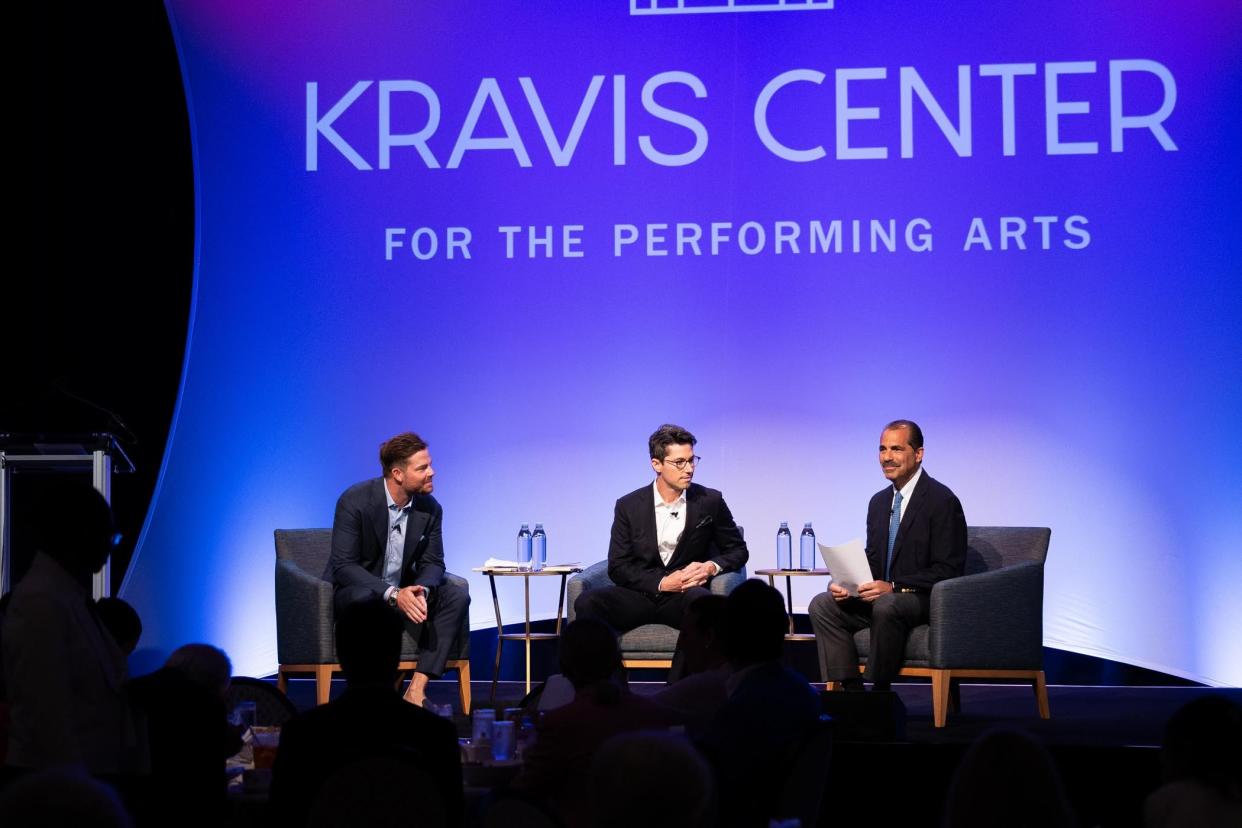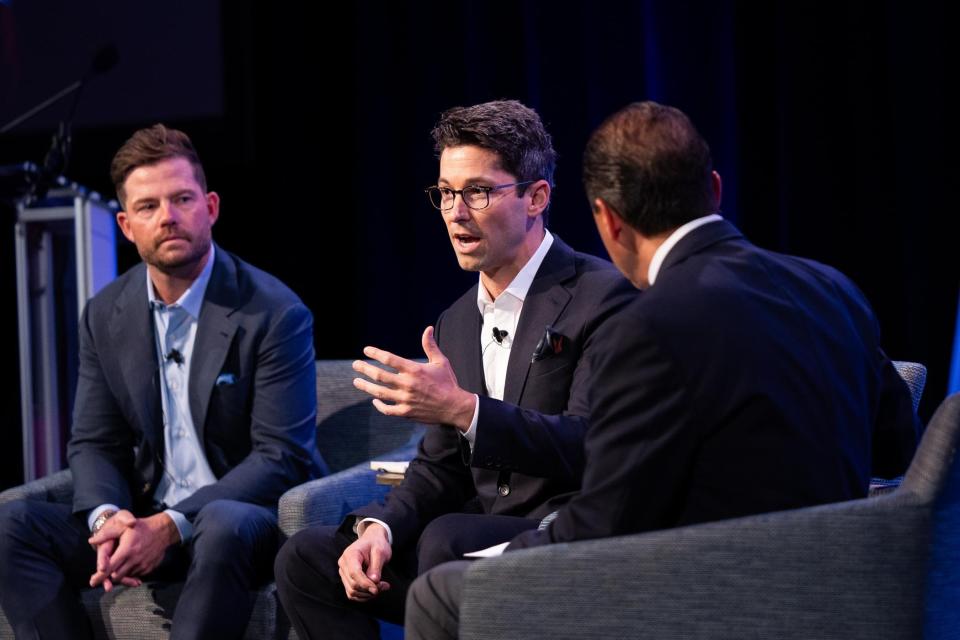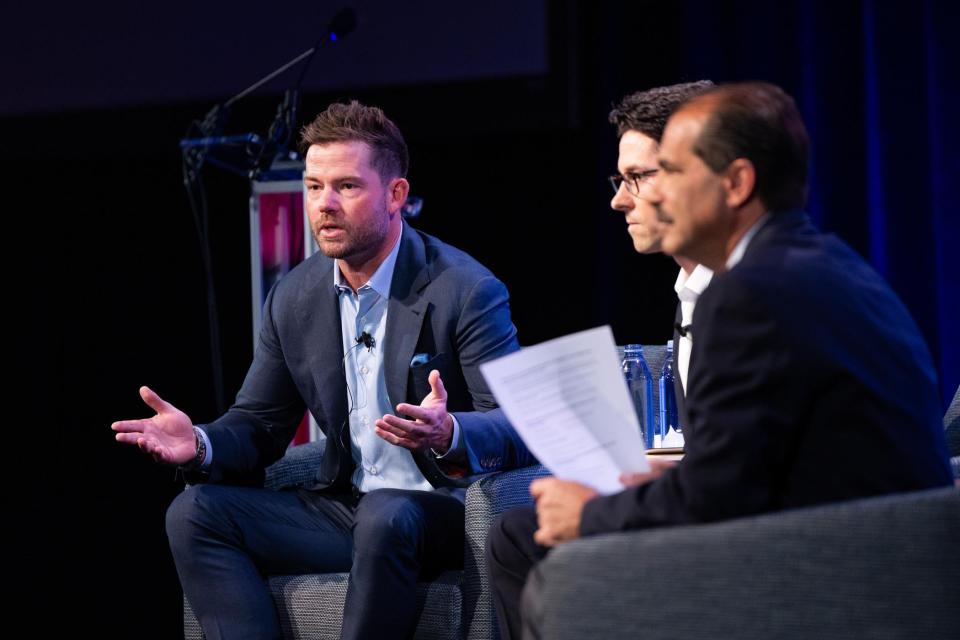Frisbie Group still has plans to redevelop Wells Fargo site, say company reps

Palm Beach developer Frisbie Group has returned to the drawing board in an effort to save a major residential redevelopment project planned for the 5.8-acres lot east of the landmarked Wells Fargo Bank buildings in the heart of town.
The company withdrew a controversial zoning request related to the project that was to have been considered this week by the Town Council.
Speaking to the Palm Beach Daily News after a Tuesday event at the Kravis Center, Frisbie Group executives Rob Frisbie Jr. and Cody Crowell said that while the company is still interested in developing the lot at South County Road and Royal Palm Way — currently owned by Wells Fargo Bank — its future will depend on the site's neighbors.
“Right now we’re going to go meet with all the neighbors again (and) discuss the (site's) reduced density, discuss the de-intensification that we’re proposing for the site,” said Frisbie. “And if we can get community buy-in, then we’ll re-engage with the Town Council."
The comments come after a statement released by the company Saturday announcing that the organization is not pursuing a planned unit development, or PUD, following a heated March 5 meeting of the Planning and Zoning Commission.
"Unfortunately, there's so much animosity around the concept of a PUD that it was kind of hard to have a conversation. ... So many people are nervous and scared of what a PUD could mean," Frisbie told the Daily News. "Unfortunately, it's not easy to explain that we're trying to do a different type of PUD."
The PUD would have replaced the three zoning districts — one for residential and two for commercial use — with its own guidelines for what can be developed within the site but with potentially stricter guidelines than those in traditional zoning rules.
While the company's representatives said they respected the community's opinion, Crowell criticized what he called negative comments made during the zoning meeting about the Frisbie family.
"I'm disappointed in the overall approach," said Crowell. "It's not right, and that's not a way to carry out any of these types of meetings." Even with their disappointment, the two Frisbie Group representatives said the last thing they wanted to do is argue with town officials.
"We don't want to get into a public back-in-forth over that," Frisbie said. "We believe that everyone on that board has the capability of being a great leader, and sometimes they don't emulate the best of themselves."

Frisbie Group speak about the future of West Palm Beach
Earlier Tuesday, they were interviewed by Paul Leone, CEO of The Breakers and vice chair of the Kravis Center Board of Directors, as part of the performing arts center's Corporate Partners Business Speaker Series. The program focused on the future of West Palm Beach and "placemaking," a development principle that centers on improving a community's quality of life. The Frisbie Group representatives said a key to this principle is a focus on health care, education and, in the case of West Palm Beach's workforce, affordability.

Creating affordable housing is especially challenging because of the high cost of construction and insurance for developers, Crowell said. Also adding to the problem is West Palm Beach's zoning code, which he said has not been updated since the 1980s.
But Crowell said there's hope, and pointed to Palm Beach County's $200 million affordable housing bond, which was approved following a countywide vote in November. He also commended West Palm Beach Mayor Keith James' initiative to expedite building permits.
"It used to take two years to get through the process. In two years, we can be in and out of this (housing market) cycle," he said. "He's now expedited that to 90 days."
Equally important is tackling the county's education system, which Frisbie and Crowell agreed is a sector where public/private partnership could have a notable impact. As an example, Frisbie noted the Bezos Academy preschool that is scheduled to open at Roosevelt Elementary School later this year. Part of a multi-state program spearheaded by Amazon and Blue Oracle billionaire Jeff Bezos, the school will offer a free Montessori-style education for the community's lower-income households.
To address any of these major issues, the county will need more funding, which Crowell said can be accomplished through tax revenue generated by residents of new development projects, such as The Related Cos.' South Flagler House ultra-luxury condominium. The project was originally planned by the Frisbie Group and Houston-based developer Hines, but Related Cos. bought the project in August for $195 million and has embarked on sales. The condominium project is rising at 1355 S. Flagler Drive.
"Let me highlight a little of what Cody said — South Flagler House is an example that will generate somewhere between $20 to $30 million annually in taxable income," Frisbie said.
Another major project discussed by the Frisbie Group representatives is the company's massive mixed-used development project that will take over 42 of the 47 acres of the Palm Beach Kennel Club (PBKC) property off Congress Avenue.
"We're going to create 1,200 multifamily units and those homes are going to be designed around large green open spaces with really high-quality architecture," Frisbie said.
While the site plan remains in development, Frisbie said the company is looking at multiple ways of reinvigorating the area surrounding the proposed multifamily complex. He floated the idea of having a grocery store, school or botanical garden built near the site.
"It's not only just building an apartment (complex), or 1,200 apartments. But how do we really impact, in a positive way the community?" C0rowell said about the project. "And do so for the future, so that we can all look back at this in 25 or 50 years and say 'Wow, that was a thoughtful approach to to the overall development on the site.'
Diego Diaz Lasa is a journalist at the Palm Beach Daily News, part of the USA TODAY Florida Network. You can reach him at dlasa@pbdailynews.com. Help support our journalism. Subscribe today.
This article originally appeared on Palm Beach Daily News: Frisbie Group speaks about future of West Palm Beach at Kravis Center

